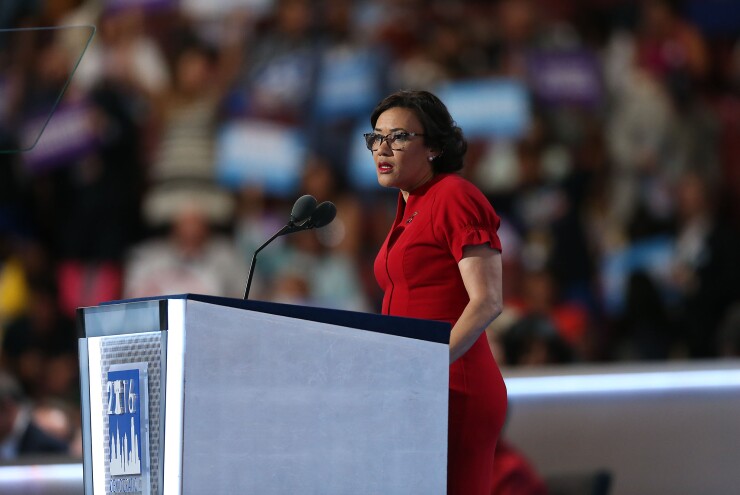DALLAS -- A Michigan state oversight board is expected to vote on Tuesday afternoon on whether to approve another 30-day water contract between the city of Flint and the Great Lakes Water Authority.
The Flint city council last Friday voted to extend the short-term contract, which expires at the end of Oct. 31, to Nov. 30 after negotiations on a longer term contract, which would have provided the city up to $9 million in annual savings including $7 million on debt service toward a bond-financed pipeline, fell through.
“Continuing with these short-term deals is costing the City much more for water each month than it would have cost had the long-term recommendation been approved months ago as planned,” Flint Mayor Karen Weaver said in a statement.

Weaver's administration has been at odds with the city council over the water deal.
Detroit-based U.S. District Judge David Lawson on Friday denied a city council’s request filed on Oct. 22 to extend a deadline to decide on the long-term contract with GLWA and said that the council’s delay has jeopardized the deal and "it is unclear whether all or part of it can be revived."
The deal -- negotiated in April by Weaver with the support of Genesee County, the lead in constructing the new pipeline, along with GLWA and state officials -- would have saved the city about $9 million by locking in a more favorable rate with GLWA and addressing the $7 million in debt service payments the city is currently obligated to pay on the Karegnondi Water Authority bonds. Flint was preparing to shift to KWA in 2019 with plans to upgrade its treatment plant to meet federal standards. The city is legally obligated to repay 34% of the $220 million 2014 bond issue that is financing construction of the authority’s 63-mile pipeline led by Genesee County.
Lawson said in an opinion filed on Friday that the need for immediate action on a long-term water contract has not diminished. “In fact as time slips away, Flint’s opportunities for an economical long term water supply contract are running out,” Lawson wrote.
Lawson had previously ordered the city council to decide on the 30-year contract with GLWA by Monday Oct. 23. An emergency motion filed by the city council late Oct. 22 bought the council an additional 24 hours. The council responded to the deadline with a two-year contract arrangement that it hoped fulfilled the state’s requirements.
Lawson said that the council’s two-year arrangement did not substitute for a long-term contract.
“There is no evidence that the proposal was communicated to GLWA, or that GLWA would be disposed to accept it," Lawson wrote. "One might wonder if GLWA, which is under an obligation to treat all of its municipal water customers with equal favor, could even accept such a proposal; or why ....GLWA would allow City Council to string it along while it attempts to secure another water source.'"
Flint City Attorney Angela Wheeler noted that the extension proposed by City Council had not been reviewed or approved by GLWA.
Weaver said she did not believe a 2-year extension was a solution.
“It does nothing to prevent Flint’s water system from becoming financially insolvent within two years, which is a very real possibility without a substantial rate increase,” Weaver said. “It is also important to note that all of GLWA’s contracts with wholesale customers are 30-year contracts, therefore it is unlikely that GLWA would agree to a two-year extension as the Council has proposed.”
With the 30-year GLWA deal off the table, Flint faces a narrowing window on the opportunity to refinance the KWA debt and in meantime must pay premium short-term rates for its water.
Weaver spokesperson Kristin Moore said that had the mayor’s long-term water deal been approved in June as planned, it would have already saved the Flint more than $1.9 million.
“City officials could have put that money to good use, to benefit the city and Flint residents,” Moore said. “The money could have been used to purchase new, more accurate water meters, replace more lead-tainted service lines, or an additional $1.9 million in the City’s budget, could have been used to lower water rates, possibly resulting in lower water payments for Flint residents.“
Since July 2017, the City has continued to make the KWA bond payment of $444,006 a month. That’s four payments at a total amount of $1,776,024.
As part of the long term contract previously negotiated with GLWA, the KWA bonds that are currently being paid by Flint would continue to be paid, but GLWA would issue credits to the City of Flint to offset the cost.
In addition to the bond payment savings, right now the city is paying GLWA more for water every month due to the higher rate of the month-to-month payment versus the payment negotiated in a long-term deal, which costs the City $1,144,000 each month.
Flint said it has budgeted $12.9 million for water with GLWA for the year. If the city continues to operate at the current rate/cost with short-term deals , it will ultimately cost the City $13,738,000 or more this fiscal year.
Lawson said that if the city fails to act on a long term contract the Michigan Department of Environmental Quality must return to court to file a motion to enforce the earlier ruling that required a city decision by Oct. 23.
In June, the MDEQ asked for a mandatory injunction directing the city to sign a 30-year deal with GLWA, from which the city currently draws its water, or present another alternative. GLWA could not be reached for comment on the status of any potential long-term contract.





